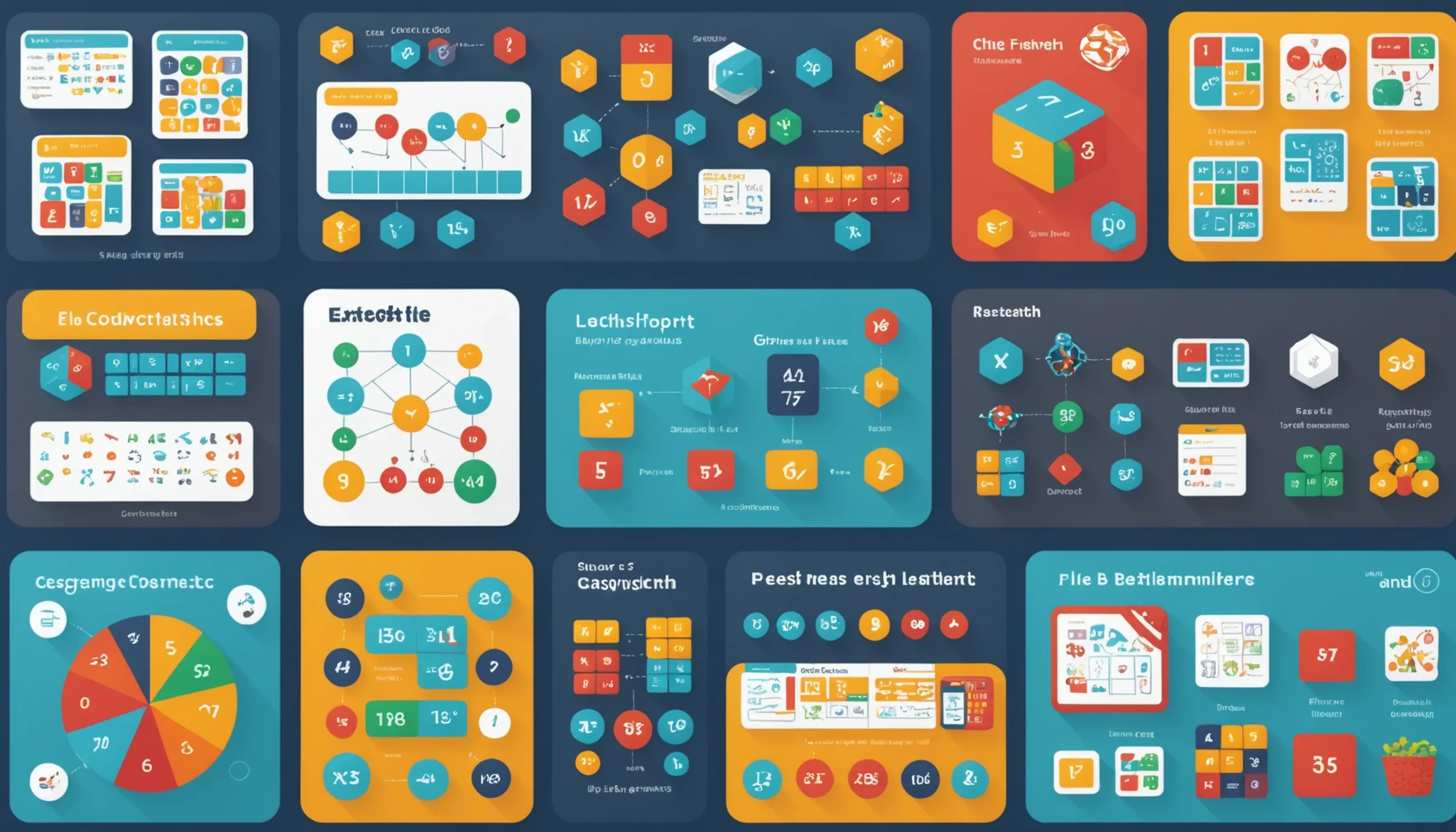How to Get Your Kid Interested in Math Using Games
 HvWHenry van Wagenberg
HvWHenry van Wagenberg
Engaging Your Teen in Math Through Games
Engaging your teen in math can be challenging, but using games can make learning enjoyable and effective. Games provide a fun way to practice mathematical concepts without the pressure of traditional learning. By incorporating games into math lessons, you can create a stimulating environment that encourages participation.
Whether it’s through board games, card games, or online platforms, the interactive nature of games helps teens grasp complex ideas more easily. This approach not only enhances their understanding but also builds their confidence in math, making them more likely to embrace the subject.
Benefits of Using Games to Teach Math
Using games to teach math offers numerous benefits that can enhance the learning experience for teenagers. One of the primary advantages is that games make math more engaging and interactive. When teens play games, they are more likely to enjoy the learning process, which can lead to increased motivation and enthusiasm for the subject.
Moreover, games often encourage critical thinking and problem-solving skills. Many math games require players to think strategically, analyze patterns, and apply mathematical concepts in real-time. This hands-on experience solidifies their understanding and helps them retain information more effectively.
Another significant benefit is the opportunity for collaboration and teamwork. Many math games can be played in groups, fostering a sense of community and encouraging students to work together. This collaborative approach not only helps them learn from one another but also builds essential social skills.
Furthermore, games can cater to different learning styles. Some students may grasp concepts better through visual aids, while others may prefer auditory or kinesthetic learning. With a variety of games available, parents and teachers can select those that best suit the individual needs of their teens.
Lastly, using games to teach math can help reduce the anxiety often associated with the subject. By creating a fun and relaxed environment, students are more likely to approach math with a positive attitude, paving the way for a lifelong appreciation of the subject.
Types of Games That Promote Math Skills
There are various types of games that effectively promote math skills among teenagers. Each type serves a unique purpose, catering to different mathematical concepts and learning styles.
Board games are a classic choice for teaching math. Games like Monopoly or The Game of Life incorporate essential math skills such as addition, subtraction, and budgeting. These games encourage strategic thinking while making calculations fun.
Card games also provide excellent opportunities for practicing math. Games like Uno or Math War challenge players to use quick calculations and reinforce number recognition. Custom card games can be created specifically to target math skills, making them adaptable to various learning levels.
Online math games offer a modern twist, making it easy for teens to engage with math through interactive platforms. Websites and apps like Kahoot! and Prodigy provide a range of math challenges that are both entertaining and educational, often incorporating elements of competition.
Puzzle games, such as Sudoku or logic puzzles, help develop critical thinking and problem-solving skills. These games require players to apply mathematical reasoning in a fun and challenging way.
Finally, role-playing games (RPGs) can also be utilized to teach math concepts. In these games, players often encounter scenarios where they must use math to achieve their goals, enhancing their understanding through immersive experiences.

Tips for Incorporating Math Games at Home
Incorporating math games at home can make learning enjoyable and effective. Start by selecting games that align with your teen's interests, whether they prefer board games, card games, or digital formats.
Set aside a regular game night to create a fun routine. Encourage friendly competition by keeping score or offering small rewards. Involve the whole family to foster collaboration and teamwork.
Additionally, adapt existing games to include math challenges, turning everyday activities into learning experiences. Lastly, utilize online resources to find new math games that suit various skill levels and concepts.
Setting Up a Math Game Night
Setting up a math game night at home can be a fantastic way to engage your teen in learning while having fun. Here are some steps to create an enjoyable and educational experience.
First, choose a date and time that works for everyone. Consistency is key, so consider making it a weekly or monthly event. Next, gather a variety of games that focus on different math skills, such as board games, card games, and online math games. This diversity will cater to different interests and learning styles.
Prepare the space by ensuring it’s comfortable and free from distractions. Set up tables or a cozy area where everyone can gather. You might even consider creating a themed atmosphere with decorations related to math, making the night feel special.
During the game night, encourage participation by explaining the rules clearly and emphasizing the importance of teamwork. Incorporate some friendly competition by keeping score or offering small prizes for winners, which can motivate teens to engage more actively.
To enhance the learning experience, take time between games to discuss strategies or math concepts that arise during play. This reflection helps reinforce their understanding. Finally, encourage feedback from your teen about what they enjoyed and any improvements for the next game night. This will help make future events even better!
Using Online Math Games and Apps
Using online math games and apps can significantly enhance your teen's math skills while making learning fun and interactive. These digital resources offer a wide range of engaging activities that cater to different learning styles and levels.
One of the main benefits of online math games is accessibility. Many platforms provide free or low-cost options, allowing easy access to quality educational content. Websites like Khan Academy, Prodigy, and Coolmath Games offer a plethora of math challenges that can be tailored to your teen’s specific needs.
These games often incorporate elements of gamification, such as levels, rewards, and leaderboards, which can motivate teens to engage regularly. As they progress through the games, they can see their improvement, fostering a sense of achievement and boosting their confidence in math.
Additionally, online math games can be played independently or as a group, making them versatile for different settings. Encourage your teen to invite friends for a virtual game night, allowing them to collaborate and compete together.
It’s also essential to monitor the types of games your teen is playing. Look for options that align with their curriculum or focus on specific math skills, such as algebra, geometry, or statistics. Many apps provide progress tracking, allowing you to stay informed about their development.
Finally, balance screen time with offline activities. Incorporate traditional games and hands-on learning to ensure a well-rounded approach to math education.

Choosing the Right Games for Different Math Topics
Choosing the right games for various math topics is crucial for effective learning. Here are some tips to guide your selection:
- Identify the topic: Determine which math concept you want to reinforce, such as:
- Algebra
- Geometry
- Statistics
- Probability
- Match the game type: Select games that align with the topic. For example:
- Board games for strategy and critical thinking.
- Card games for quick calculations and number recognition.
- Online games for interactive learning.
- Consider skill level: Ensure the game is appropriate for your teen's current math skills to promote confidence and engagement.
Games for Algebra and Geometry
Engaging teens in algebra and geometry through games can make these subjects more approachable and enjoyable. Here are some effective game ideas for each topic that reinforce skills while keeping learning fun.
For algebra, consider the following games:
- Algebra Tiles: These physical or virtual manipulatives help students visualize equations and understand variables. They can be used to model expressions and solve equations.
- Equation Bingo: Create bingo cards with solutions to various equations. Call out equations, and players must solve them to find the corresponding answer on their card.
- Math Jeopardy: Tailor this classic quiz game to focus on algebra concepts. Categories can include solving equations, graphing functions, and identifying properties.
When it comes to geometry, here are some engaging games:
- Geometry Scavenger Hunt: Create a list of geometric shapes or angles for teens to find around the house or outdoors. They can take photos or draw the shapes they discover.
- Tangrams: This classic puzzle game involves fitting pieces together to form specific shapes. It promotes spatial reasoning and understanding of geometric properties.
- GeoBoard Games: Use geoboards to create different shapes and explore their properties. Incorporate challenges, such as creating specific angles or polygons within a time limit.
These games not only reinforce key concepts but also encourage collaboration and critical thinking, making algebra and geometry more enjoyable for teens.
Games for Statistics and Probability
Introducing teens to statistics and probability through games can make these concepts more relatable and enjoyable. Here are some engaging game ideas that promote understanding while keeping learning interactive.
For statistics, consider the following games:
- Data Collection Challenge: Have teens design a survey on a topic of interest, collect responses, and analyze the data. They can create graphs or charts to visually represent their findings.
- Statistics Jeopardy: Tailor a Jeopardy-style game to focus on statistical concepts, such as mean, median, mode, and standard deviation. Players can compete in teams, answering questions to earn points.
- Guess the Average: Present various scenarios and ask players to guess the average of given data sets. This can lead to discussions about how averages can be misleading.
When it comes to probability, try these games:
- Probability Bingo: Create bingo cards with different probabilities or outcomes. Call out events (e.g., flipping a coin, rolling dice), and players must mark the corresponding probabilities on their cards.
- Coin Toss Games: Use coin tosses to teach probability concepts. Players can predict outcomes and record results to determine empirical probabilities.
- Probability Simulation Games: Use online platforms or apps that simulate random events, allowing players to explore the law of large numbers and probability distributions.
These games not only reinforce key concepts but also encourage critical thinking and collaboration, making statistics and probability accessible and enjoyable for teens.
Collaborative Games for Team Building in Math
Collaborative games for team building in math can significantly enhance communication and problem-solving skills among teens. Here are some effective game ideas:
- Math Relay Races: Teams compete to solve math problems, passing a baton after each correct answer. This promotes teamwork and quick thinking.
- Group Puzzles: Provide math-themed puzzles that require collaboration to solve. Encourage discussions as teams work together to find solutions.
- Escape Room Challenges: Design math escape rooms where teams must solve a series of math-related challenges to “escape” within a time limit, fostering cooperation and strategic thinking.
Encouraging Friendly Competition
Encouraging friendly competition among teens during math games can enhance engagement and motivation while fostering a positive learning environment. Here are some strategies to incorporate friendly competition into your math game sessions.
First, establish clear rules and objectives for each game. Make sure all participants understand the scoring system and how to earn points. This clarity helps create a fair environment where everyone knows what to aim for.
Next, introduce team-based competitions. Divide players into small teams and have them work together to solve problems or complete challenges. This not only fosters collaboration but also adds a layer of competition as teams strive to outperform one another. You can create a leaderboard to track points, encouraging teams to improve their performance.
Incorporating timed challenges can also heighten the competitive spirit. Set a timer for solving math problems or completing tasks, and reward the fastest team or individual with points. This can lead to exciting moments and keep the energy high.
Additionally, consider offering small prizes or certificates for winners. These can be simple rewards, like stickers or a math-themed trophy, but they can significantly boost motivation and enthusiasm.
Lastly, emphasize the importance of sportsmanship. Encourage players to celebrate each other's successes and to focus on personal improvement rather than solely on winning. This approach promotes a positive atmosphere, helping teens enjoy the competitive aspect while learning valuable math skills.
Creating Group Challenges and Tournaments
Creating group challenges and tournaments can be an exciting way to engage teens in math while fostering teamwork and competition. Here’s how to set up these events effectively.
First, decide on the format of the tournament. You can organize it as a single-elimination competition, where teams face off until a champion is determined, or as a round-robin format, allowing each team to compete against all others. Choose the format that best suits the number of participants and the time available.
Next, establish clear rules and guidelines for the challenges. Outline the types of math problems or games that will be included, such as algebra quizzes, geometry puzzles, or probability games. Ensure that the challenges are appropriate for the skill levels of all participants to keep everyone engaged and challenged.
To enhance the excitement, create team names and encourage participants to come up with team colors or themes. This adds a fun element and helps build camaraderie among team members.
Consider incorporating a point system to track team progress throughout the tournament. Award points for participation, correct answers, and teamwork, and keep a leaderboard visible to maintain enthusiasm and motivation.
Finally, celebrate the winners with small prizes, certificates, or even a trophy. This recognition not only rewards their hard work but also encourages continued participation in future challenges.
By creating group challenges and tournaments, you can cultivate a lively atmosphere that promotes learning and strengthens friendships among teens while enhancing their math skills.
